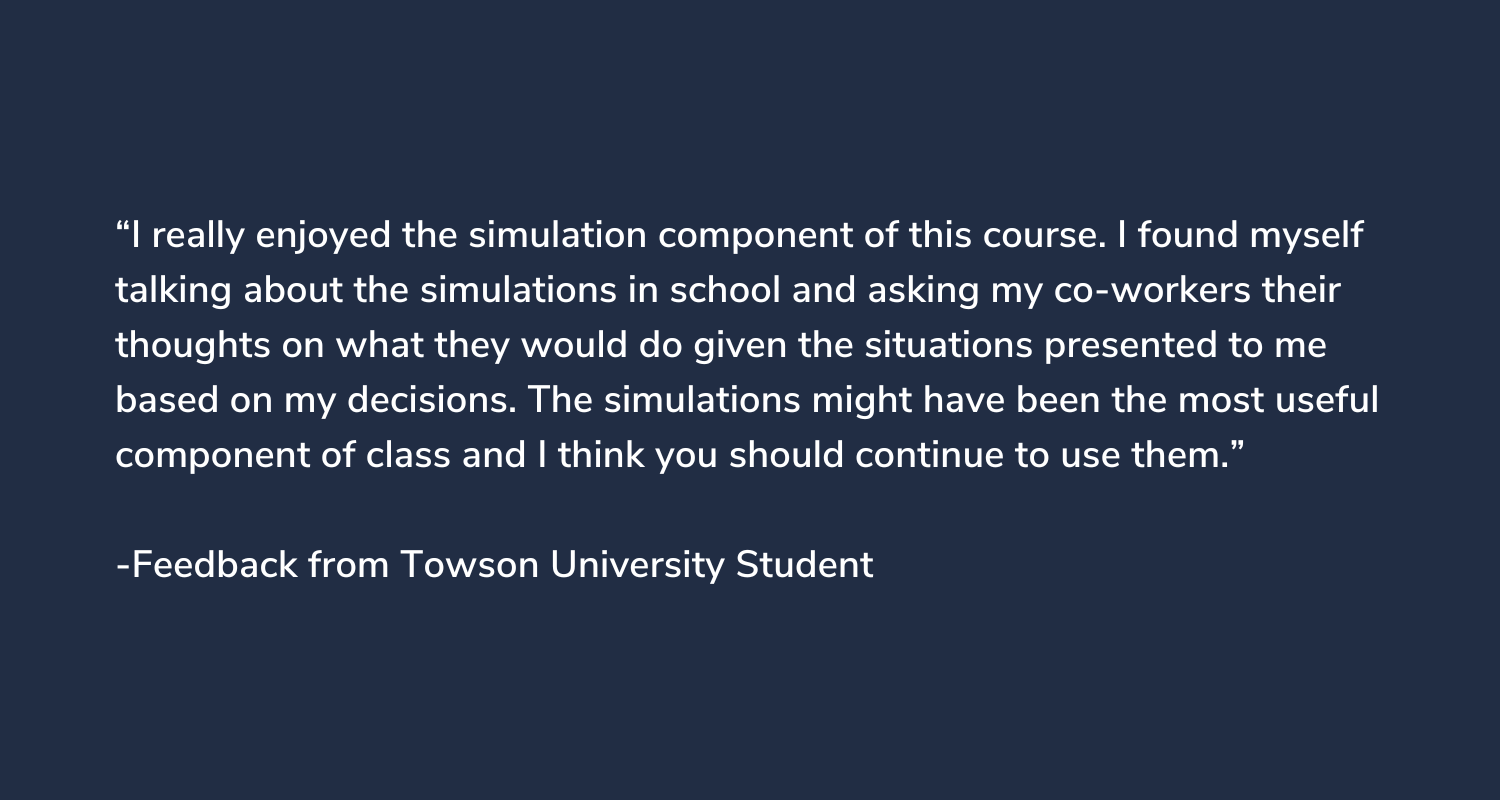Mr. Tom Evans, a lecturer at Towson University, discovered SchoolSims through a colleague and never looked back. After meeting with Ken Spero, CEO of SchoolSims, Mr. Evans learned about the power simulations held for aspiring leaders, and he has used them ever since. Through simulations, “I was exposed to the wide range of possible responses to situations that are deemed correct and the importance of reflection on why a given response was an accurate one.” It did not take long for Mr. Evans to realize how simulations fulfill the critical component of experiential learning in working with aspiring leaders. The simulations allow students to apply what they have learned in administrative coursework to what they will undoubtedly experience on the job. “Simulations fill the gap between what was learned in the classroom and handling situations on the job that require high-quality decision-making, i.e. judgment.”

Mr. Evans began using simulations in his educational leadership program a few years ago by facilitating the sims synchronously. Students began asking the question: “Why are other instructors not using this tool?” He has since begun using them asynchronously in the current virtual world of teaching. This is done through the students watching the simulations on their own and participating in online discussions through the university’s LMS system. Students are asked to respond initially to questions posed in the Discussion Board and then to interact with other classmates’ responses.
The effectiveness of the simulations in Mr. Evans’s educational leadership program is measured in various ways. Student responses are scored based on response quality using the included feedback report. The depth of knowledge and application of course content is specifically examined. Effectiveness is also measured through survey feedback with students. One student wrote, “The simulations were an excellent tool to practice the competencies that I will use as an administrator. They were also the most helpful in preparing for behavioral interview questions that provide a scenario. As a result of the simulations, I am able to explain exactly what steps I would take to resolve a situation.”
Simulations are beneficial to both the professor and the students. The simulations are often less expensive than textbooks, and Mr. Evans has used the simulations, at times, to replace the cost of expensive textbooks. Today, Mr. Evans regularly attends and contributes during the SchoolSims monthly webinar series and has also facilitated a simulation during a recent session, which you can view here. Mr. Evans intends to facilitate more in the future because he believes strongly in the value of simulations and experiential learning. In addition to his regular teaching use of the sims, Mr. Evans has also recently conducted two sims for SchoolSims, one with Texas assistant principals and one with a nationwide audience with a school culture simulation.
When selecting a simulation, Mr. Evans considers the outcomes of the courses to be addressed, the audience’s background, experience, and needs while making his choices. When asked about his favorite simulations, Mr. Evans stated, “I’d say Disruptive Teacher and Cultural Competency are two of my favorites, based on how many times I’ve utilized them. It is easy for students to see themselves as leaders quickly in each, given the familiarity they have with similar situations in their own schools. Some of the earlier comments piqued my interest in Disruptive Teacher. It’s a real-life example of a school that requires more than a reminder of its values, such as its vision, mission, and objectives. It also gives administrators the chance to talk about what they should do to document bad teacher behavior and how they should go about doing so. Cultural Competency is a great fit for our ILPD and University’s equality and cultural support aims.”
Mr. Evans finds the simulations to be really useful in forcing students to analyze situations, interact with others based on shared content, gain new insights, and gain confidence in their own ability to make the right decisions. Students confirmed these qualities and believe the simulations help them become more decisive leaders, while also exposing other areas where they continue to grow and improve. Mr. Evans strongly advises that the simulations be used in future classes to continue to give his students additional real-world experiences and opportunities to apply what they have learned.
Mr. Evans continues to use simulations to their maximum potential in his classes for aspiring teachers and leaders. Below is a previous webinar recording in which Mr. Evans led an audience of teachers, school officials, and students through our’ Leading School Culture Change’ simulation. Do you want to contact Mr. Evans and learn more about his own experiences? His contact details can also be found below.
Leading School Culture Change Webinar
Mr. Tom Evans
Phone: (410) 704-4623
Email: tgevans522@gmail.com